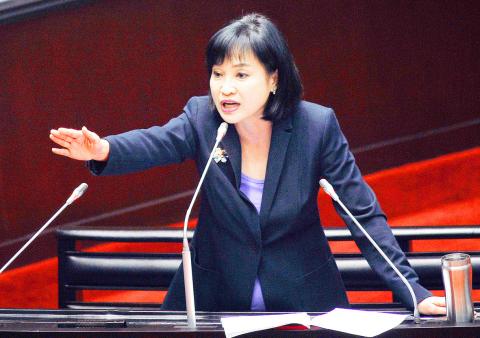The government has deliberately stalled the appointment of National Taiwan University president-elect Kuan Chung-ming (管中閔) due to the influence of former Ministry of Education secretary-general Chuang Kuo-jung (莊國榮), Chinese Nationalist Party (KMT) Legislator Ko Chih-en (柯志恩) said yesterday.
During a question-and-answer session at the Legislative Yuan in Taipei, Ko compared the Ministry of Education’s handling of Kuan’s election and that of National Yang-Ming University president Steve Kuo (郭旭崧), and said there appeared to a double-standard.
National Taiwan University’s election committee on Jan. 5 elected Kuan to succeed Yang Pan-chyr (楊泮池), and he was scheduled to take office on Feb. 1, but the ministry has delayed confirming his appointment by asking the university to clarify issues regarding an alleged conflict of interest in the election process and an accusation of alleged plagiarism against Kuan.

Photo: Liao Chen-huei, Taipei Times
Kuan allegedly did not tell the committee that he was an independent member of Taiwan Mobile’s board of directors, and Taiwan Mobile vice chairman Richard Tsai (蔡明興) is on the election committee.
Before Kuo was elected president of National Yang-Ming University, he was an independent director of SyneuRx and the director of the pharmaceutical company, Chang Hung-jen (張鴻仁), was the convener of that school’s election committee, Ko said.
While National Yang-Ming University was never required to address the alleged conflict of interest, the education ministry has continued to stall approving Kuan’s appointment even after National Taiwan University’s election committee met again to discuss the issue, she said.
Premier William Lai (賴清德) told Ko that the government was not deliberately delaying Kuan’s appointment, and that everything was being done according to regulations.
Ko asked if the ministry had really been following regulations.
“Article 9 of the University Act (大學法) does not give the ministry any power to veto or select a university president, but it has continued to try and block Kuan’s appointment” she said.
The ministry has decided to delay Kuan’s appointment because Chuang, “known as the underground ministry of education,” has insisted that it wait until National Taiwan University holds an extraordinary university council meeting to resolve controversy surrounding Kuan’s eligibility, she said.
Lai must properly investigate the situation, because “this is no longer a problem within the ministry,” she added.
Minister of Education Pan Wen-chung (潘文忠) told Ko that university council meetings are held by council representatives and cannot be manipulated.
The ministry has not handled Kuan’s case differently, he said.
Questions surrounding Kuan’s alleged conflict of interest and plagiarism are related to his eligibility to be a university president, so the ministry has the responsibility to clarify those issues before it can complete the appointment process, Pan added.

Alain Robert, known as the "French Spider-Man," praised Alex Honnold as exceptionally well-prepared after the US climber completed a free solo ascent of Taipei 101 yesterday. Robert said Honnold's ascent of the 508m-tall skyscraper in just more than one-and-a-half hours without using safety ropes or equipment was a remarkable achievement. "This is my life," he said in an interview conducted in French, adding that he liked the feeling of being "on the edge of danger." The 63-year-old Frenchman climbed Taipei 101 using ropes in December 2004, taking about four hours to reach the top. On a one-to-10 scale of difficulty, Robert said Taipei 101

Taiwanese and US defense groups are collaborating to introduce deployable, semi-autonomous manufacturing systems for drones and components in a boost to the nation’s supply chain resilience. Taiwan’s G-Tech Optroelectronics Corp subsidiary GTOC and the US’ Aerkomm Inc on Friday announced an agreement with fellow US-based Firestorm Lab to adopt the latter’s xCell, a technology featuring 3D printers fitted in 6.1m container units. The systems enable aerial platforms and parts to be produced in high volumes from dispersed nodes capable of rapid redeployment, to minimize the risk of enemy strikes and to meet field requirements, they said. Firestorm chief technology officer Ian Muceus said

MORE FALL: An investigation into one of Xi’s key cronies, part of a broader ‘anti-corruption’ drive, indicates that he might have a deep distrust in the military, an expert said China’s latest military purge underscores systemic risks in its shift from collective leadership to sole rule under Chinese President Xi Jinping (習近平), and could disrupt its chain of command and military capabilities, a national security official said yesterday. If decisionmaking within the Chinese Communist Party has become “irrational” under one-man rule, the Taiwan Strait and the regional situation must be approached with extreme caution, given unforeseen risks, they added. The anonymous official made the remarks as China’s Central Military Commission Vice Chairman Zhang Youxia (張又俠) and Joint Staff Department Chief of Staff Liu Zhenli (劉振立) were reportedly being investigated for suspected “serious

American climber Alex Honnold is to attempt a free climb of Taipei 101 today at 9am, with traffic closures around the skyscraper. To accommodate the climb attempt and filming, the Taipei Department of Transportation said traffic controls would be enforced around the Taipei 101 area. If weather conditions delay the climb, the restrictions would be pushed back to tomorrow. Traffic controls would be in place today from 7am to 11am around the Taipei 101 area, the department said. Songzhi Road would be fully closed in both directions between Songlian Road and Xinyi Road Sec 5, it said, adding that bidirectional traffic controls would